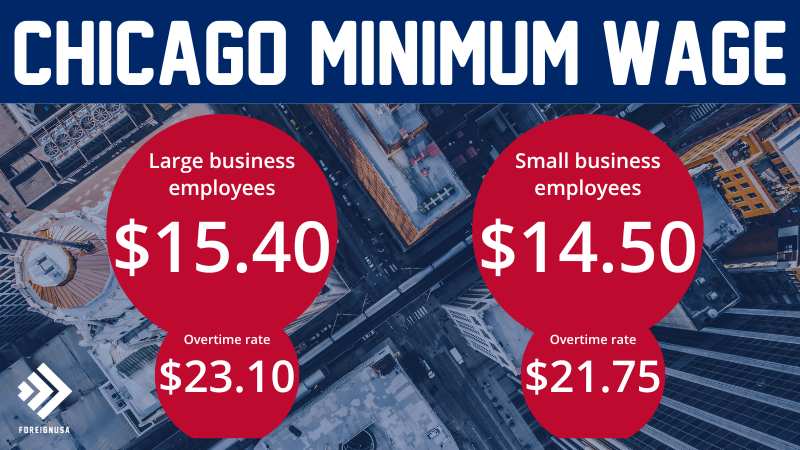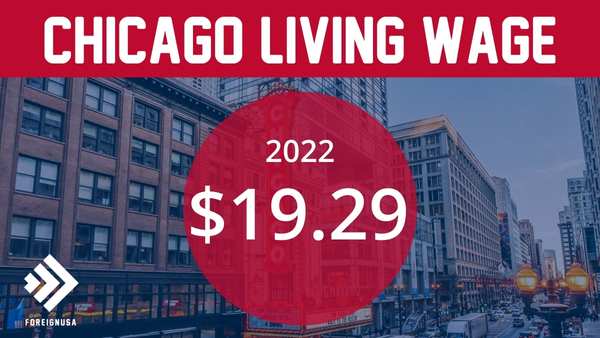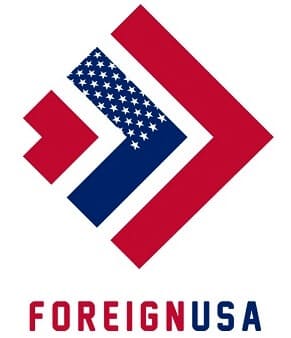The Chicago minimum wage in 2023 is $15.40 per hour; however, this is only for large business employees. A large business is one with 21 employees or more. For small businesses (4 to 20 employees), the minimum wage is $14.50 per hour.
Those who work for large businesses that receive tips will be paid an hourly minimum wage rate of $9.24 per hour, with an additional tipped credit rate of $6.16.
Small business tipped employees in Chicago are subject to an hourly minimum wage of $8.70 per hour with the addition of a tip credit of $5.80 per hour.
The graphic below displays the various Chicago minimum wage rates for 2023, showing a more visual representation of the city’s somewhat confusing minimum wage system.

Minimum Wage in Chicago Earnings
Chicago is one of the most popular cities in the nation, with many people choosing the Windy City as their new home due to the large consumer and job market, never-ending lists of things to do and places to go and see, as well as having a stable economy and strong economic infrastructure.
Let’s look at your earnings if you are an employee paid the minimum wage in Chicago for 2023:
- If you are working for a large business in Chicago (21 or more employees), then you could earn up to $616 per week (15.40 x 40). You will also be paid $2,464 per month ($616 x 4) and $32,032 per year (15.40 x 2080) before taxes.
- If you work for a small business in Chicago (4 to 20 employees), you could earn up to $580 per week (14.50 x 40). You will also be paid $2,320 per month ($580 x 4) and $30,160 per year (14.50 x 2080) before taxes.
It is important to note that this is how much you can be paid if you are subject to the minimum wage in Chicago, and in a lot of circumstances, you will likely be paid even more than the minimum wage in Chicago, Illinois.
Chicago Minimum Wage Exemptions
There are rules and laws to ensure that employers are paying their employees the minimum wage or above in Chicago, IL, unless they are exempt employees.
Below are the minimum wage rates for exempt employees in Chicago:
- Chicago’s minimum wage for large businesses that hire tipped employees is $9.24 per hour with a tip credit rate of $6.16.
- Chicago’s minimum wage for small business employees is $8.70 per hour, with a tip credit rate of $5.80.
- The overtime minimum wage for large business employees in Chicago is $23.10 per hour for every hour that surpasses 40 in a working week.
- The overtime minimum wage for small business employees in Chicago is $21.75 per hour for every hour that surpasses 40 in a working week.
- The minimum wage for employees under the age of 20 is $4.25 per hour for the first 90 days of employment, and after this, they are eligible for their Chicago minimum wage rate.
- Youth workers in Chicago are to be paid a minimum wage of $12.00 per hour, with an overtime rate of $18.00 per hour once 40 hours a week has been surpassed.
- The student minimum wage for large business employees is 85% of the minimum wage rate, making it $13.09 per hour.
- The student minimum wage for small business employees is 85% of the minimum wage rate, making it $12.32 per hour.
What is the Chicago Living Wage?
Chicago is a massive city with even bigger opportunities! The competitive and large job market has certainly helped make the city’s minimum wage rate one of the highest in the entire nation, as well as the comparatively high cost of living.
Regardless of the minimum wage being so high, residents of Chicago will still need to face the reality of expenses and the overall costs of living.
There is a living wage for Chicago, which has been calculated based on how much an individual living in Chicago will need to make to successfully pay their bills, food, and the general cost of living while residing in the city.

The living wage for an adult living alone with no children in Chicago is $19.29 per hour (via Living Wage Calculator), which is $3.89 higher than the highest version of the minimum wage for the city itself.
Several employers consider this when they contemplate how much they should be paying employees in the Windy City.
Taking all of the living expenses into account, the living wage annual salary (for a full-time person) in Chicago is $40,123 before state income tax in Illinois.
Chicago Living Wage for 1 Adult
Below is a table representing the living wage in Chicago for a single adult, with different living wages for the additional amount of children they live with and care for.
| Single Adult | 0 Children | 1 Child | 2 Children | 3 Children |
|---|---|---|---|---|
| Living Wage | $19.29 | $36.04 | $44.91 | $58.97 |
| Poverty Wage | $6.19 | $8.38 | $10.56 | $12.74 |
Chicago Living Wage for 2 Adults
The table below showcases the living wage in Chicago for two adults with only one working, including the costs for the different numbers of dependent children.
| 2 Adults (1 working) | 0 Children | 1 Child | 2 Children | 3 Children |
|---|---|---|---|---|
| Living Wage | $28.58 | $33.96 | �$39.66 | $43.16 |
| Poverty Wage | $8.38 | $10.56 | $12.74 | $14.92 |
What is the Average Wage in Chicago?
Now that we know the minimum wage, exemptions, and the cost of living, or living wage, in Chicago, let’s take a look at what the average wage is for employees in Chicago.
According to salaryexpert.com, the average base hourly rate is approximately $32.17 per hour in Chicago. If you worked full-time (40 hours per week or 2080 hours per year), your average annual gross income would be approximately $66,913 before income tax is deducted.
So, as an employee or future employee in Chicago, you have a good chance of being paid a higher wage than the minimum wage of $14.50 or $15.40 per hour, depending on the size of the business you work for.
If the living wage in Chicago is $19.29 and the average salary equates to an effective hourly rate of $32.17 per hour, Chicago can be a compelling city that many people may wish to move to.
However, the average wage in Chicago is just an average calculation, and you could earn more than this when moving to the state. Alternatively, you may be paid less, especially with the minimum wage being much lower per hour.
Final Thoughts
The Chicago minimum wage is unique to the city and is higher than the rest of Illinois’ minimum wage rates. Not only is the minimum wage so high within the city, but the average wage is comparatively great too, and not to mention that the living wage and cost of living are undoubtedly manageable too.
So, Chicago is undoubtedly a city that should be on your radar if you have ambitions of earning good money whilst unlocking many opportunities for yourself with the brilliant business and economic climate Chicago offers.


